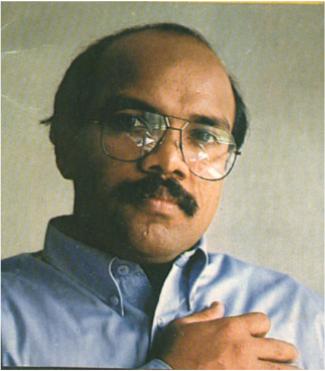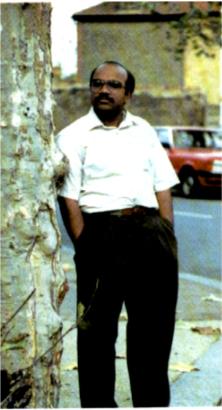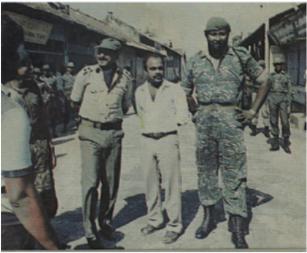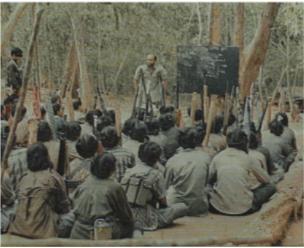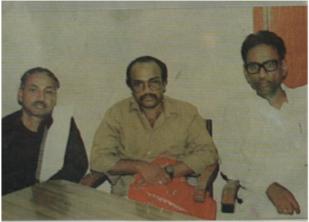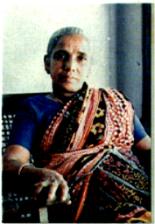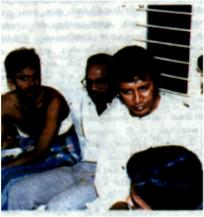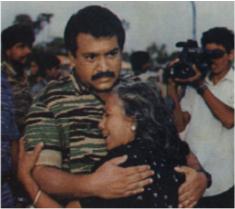| Sathasivam Krishnakumar
One of the most beloved of all the Thamileelam leaders, Sathasivam Krishnakumar, affectionately referred to as ‘Kittu’, died aboard his ship MV Ahat, on 16th January 1993. Ilankai Tamil Sangam, USA, wishes to salute this fallen hero, on the Anniversary of this tremendous, heartbreaking, loss.
|
||||
The Struggle was his LifeBy Nadesan Satyendra Sathasivam Krishnakumar whose 33rd birthday fell on January 2 [1993] is no longer with us. I had known Kittu for a relatively short period of three years. And as I write I am mindful that there are many others who have known and worked with him for much longer periods of time; who have known and worked with him since the early days of the Liberation Tigers when they numbered only a handful to the days when he functioned as Commander in Jaffna. I am mindful also of the thousands of others in Tamil Eelam and in many other parts of the world whose lasting affection he has won. And I count myself as one of them. During these last three years, I have gained many insights both of Kittu, as a leader of a people and of the movement of which he was such an illustrious part. I have been enrichened in the process. Mahatma Gandhi was once asked whether he sought power. He replied no, I do not seek power. I seek to serve. But, he added truthfully: “I know that as I serve power will accrue to me.” Sathasivam Krishnakumar served his people and served them well. As he served his power to influence and direct his people grew. It seems to me that in the end, that is what charisma is about. Kittu was a charismatic leader. His commitment to the struggle and to the leader of that struggle, Velupillai Pirabakaran was total. I remember a story he once related about a conversation that he had with a long-standing Tamil expatriate supporter of the struggle, whose commitment to the struggle was unquestioned. He said that he had told this Tamil expatriate: “You know, I would rate your commitment, at say 50% or 60%; in fact I would rate my own commitment at perhaps 85% or 90% compared with Thalaivar Pirabakaran’s commitment of 100% - after all that is why he is the leader and we follow” It was Kittu’s way of saying that in the end ‘commitment’ must be measured, not simply by the words one utters but by what one gives to the struggle in terms of oneself. Some six months ago I was in Lucerne in Switzerland. A young Eelam Tamil activist took me around some excavations of pre ice age rocks. As we came out, at the exit there was a geological clock which illustrated the reality that on a 24-hour time scale, man’s own existence may be counted in seconds. I remarked aloud that it was in our existence in a speck of time, and that too, in a speck of space, that conflict and confrontation seem to assume such great importance. The young Eelam Tamil activist was quick to respond. He said: ‘‘Annai, what you say is true. But how many of us truly live our lives on the basis of that perception? In the case of Pirabakaran, he has committed his life to what he believes must be done, here and now’’. This young Eelam Tamil activist, who if not for standardisation, may have made his own contribution to further intellectual thought in some university, was making a succinct point: ‘‘No Vethantham please.’’ It was persons such as this young Eelam Tamil activist in Lucerne that Sathasivam Krishnakumar nurtured, enthused and cultivated. Kittu once said to me: ‘‘Orators do not become leaders but leaders may become orators.’’ Words, which were not related to deeds, were worthless. In Aurobindo‘s words: “Truth and knowledge are an idle gleam if they do not bring power to change the world.” Sathasivam Krishnakumar belonged to the true intelligentsia of Tamil Eelam. Not to the pseudo intelligentsia which reads books that other people write to find ideas which they can then expound or worse still, pass off as their own. Not to the pseudo intelligentsia, which writes and thinks in English and has little understanding of that which is felt and thought by the Tamil people. Not to the pseudo intelligentsia, which quarrels endlessly about what ought to be done without knowing how or when to start. Sathasivam Krishnakumar, abstracted and conceptualised his own experience, read widely, sought to integrate that which he read with his life and then set about influencing a people to action. To him, theory was a very practical thing. He was an intellect with a deep understanding and a great breadth of vision. His interests covered a wide spectrum: culture to human rights; methods of warfare to diplomacy and political manoeuvre; providing children with playgrounds and nurseries to the emancipation of women. Every thing was related to the need of the struggle back at home. He once said to me about the Tamil Nation monthly, which I edited: ‘‘Annai, what you write, I like to read but the sentences are some times long and difficult to follow. There may be others like myself who may have difficulty to read in English but they too should be able to read and understand.’’ I learnt, and tried to change as best as I could. At the same time, he was not small-minded. He was strong enough to praise. He had an understanding of layout and the need to marry content with form. He would praise the lay out of the paper - not generally but in relation to specific pages and photographs - but always prefacing his comment with ‘‘I do not say it simply to praise’’. He was interested in photography as an influential instrument of communication. It was not surprising that during recent months he should have sought to express himself in painting in oils and in acrylic. He was a perfectionist in all that he did. The video, the booklet, even appearance at a conference in Geneva. ‘‘If you are appearing as a representative of a nation amongst other nations, appearance too is important.’’ He was always thinking and reflecting about the struggle and urging others to do the same. Ideating - almost compelling others to ideate, he was a restless engine of the struggle. There was an enthusiastic eagerness to learn and apply that learning which was infectious. He was a good cook and he enjoyed his cooking. There was an occasion, about an year ago, when he said: ‘‘Annai: today I will cook.’’ He turned out an excellent mutton curry. It was rather spicy and hot, but, perhaps, that was not surprising. He said: “You know, every one in the struggle on the ground had to learn to cook. At best, we had only one meal a day. We took turns cooking. But those who cooked simply because it was a duty to be done, did not turn out tasty food. Those who put their heart into it were the good cooks. After cooking, when I shared the food with the others I began to have some understanding of how my mother must have felt when she cooked for her children.’’ He added: “Recently, a book written by some Tamil academics tried to trivialise this by saying that ‘cooking’ is the only ideology that we have. These so called ‘academics’ seem to have little understanding about how a struggle takes shape on the ground and the human relationships that are built.” He would talk of the early beginnings when they were but a handful. How Pirabakaran picked his early team members - many of who were now dead. He would talk about his days in Jaffna as Commander. About the small zoo where the children came to see the animals, the leopards and the monkeys. How the children called him Kittu Mama. His eyes lit up and the listeners also caught something of his enthusiasm and affection. He would speak of action in battle - how single-minded one needed to be once engaged in battle. There could be no wavering. No question of a Hamlet-like ‘to be or not to be’. He would pause reflectively and say: “It was almost as if one was transformed in the heat of battle into another being.” He was a disciplined follower of his leader – A steadfast fighter in the struggle for freedom. He talked about the power that Mahatma Gandhi wielded and the importance of rooting a movement in the people. He disliked labels for spiritual endeavour. He rejected established religions. At the same time there was a recognition by him of the spiritual in man. He once asked: ‘‘what is the proper Tamil word for that which you call spiritual?’’ We ended up by agreeing that we may call it ‘athmeeham’. At the same time, he recognised that this too was a label. Again there was always the seeking for the roots of spirituality in our own people, in the growth of our own Dravidian culture and traditions. He was an opponent of casteism and Brahminism and rejected it at every turn. Above all else he was a leader of people. He commanded not simply the respect but also the loyalty and love of those with whom he worked. He had difficulty with reading in English, but as each month went by his command of the language became better. He was interested in reading about detailed organisational methods – the training of individuals to better perform their tasks. He would say it is not enough to simply meet together for the particular project in hand. A freedom movement cannot be built that way. He would urge: “You need to get know people, move with them, go to their homes.” He agonised over the role of Tamil expatriates. The need to mobilise their support for the struggle was paramount in his mind. At the same he was concerned that somehow this was not as successful as it should be. Sometimes he would ask: “Are we doing it wrong? Don’t they know that we already know many of the things that they are telling us? That they can help to strengthen the legitimacy of the struggle and create the political space in the international arena for the struggle on the ground to succeed?” The International Federation of Tamils was a brainchild of Kittu. He did not see it as some elitist grouping of the Tamil middle class in the capitals of the world but as an organisation rooted in the Tamil struggle for recognition as a people - which could link the young Tamil speaking activist with the older, often English speaking middle aged Tamil with English speaking children. It was an interaction from which both would gain. Tamil nationalism was not something to give learned lectures in academic circles. He urged some of us to write in Tamil. He said there was a need to disseminate our reflections to reach our people and “our soil”. That Kittu should have found it difficult to find a home outside Tamil Eelam is perhaps not surprising. That he should have died whilst he was so close to the land of his birth, the land and people which were so much part of him - that will bring tears of anguish to those who have come to know him and share in some small measure the vision that he had. But let not our tears be simply tears of grief. The Tamil national struggle is no tea party. Freedom will not be served on a silver platter. “We are building a road,” Kittu would often say. “I do not know whether I myself will be alive to see the road being completed. But that does not matter. There will be others to take the road further.” The struggle was Sathasivam Krishnakumar’s life and in the end he gave his life so that the struggle may continue to live. And as we salute Sathasivam Krishnakumar let us re-dedicate ourselves to the cause for which he gave his life. |
||||
|
Courtesy: TamilNation |
||||
